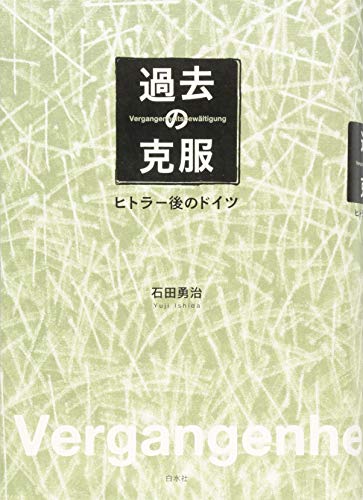- 著者
- 石田 勇治
- 出版者
- 市民セクター政策機構 ; 1980-
- 雑誌
- 社会運動 = Social movements (ISSN:03892670)
- 巻号頁・発行日
- no.430, pp.182-201, 2018-04
1 0 0 0 OA 比較ジェノサイド研究の射程 ―20 世紀前半の事例から―
- 著者
- 石田 勇治
- 出版者
- 現代史研究会
- 雑誌
- 現代史研究 (ISSN:03868869)
- 巻号頁・発行日
- vol.50, pp.71-78, 2004-12-26 (Released:2019-08-10)
- 参考文献数
- 21
1 0 0 0 過去の克服 : ヒトラー後のドイツ
1 0 0 0 OA ダン・ストーン著、武井彩佳訳 『ホロコースト・スタディーズ 最新研究への手引き』
- 著者
- 石田 勇治
- 出版者
- 日本ユダヤ学会
- 雑誌
- ユダヤ・イスラエル研究 (ISSN:09162984)
- 巻号頁・発行日
- vol.28, pp.127-128, 2014 (Released:2017-04-07)
1 0 0 0 IR ジェノサイド研究の展望 : 国際シンポジウム「平和構築と地域研究」の報告を中心に
- 著者
- 石田 勇治 川喜田 敦子
- 出版者
- アジア経済研究所
- 雑誌
- アジア経済 (ISSN:00022942)
- 巻号頁・発行日
- vol.46, no.6, pp.66-76, 2005-06
1 0 0 0 OA ヴァイマル初期の戦争責任問題 -ドイツ外務省の対応を中心に-
- 著者
- 石田 勇治
- 出版者
- JAPAN ASSOCIATION OF INTERNATIONAL RELATIONS
- 雑誌
- 国際政治 (ISSN:04542215)
- 巻号頁・発行日
- vol.1991, no.96, pp.51-68,L9, 1991-03-30 (Released:2010-09-01)
- 参考文献数
- 82
The election of an avowed monarchist, seventy-seven-years old Field Marshal Paul von Hindenburg as the president of the Weimar Republic in April 1925 symbolizes the remarkable continuity in political attitude of the Germans from the time of empire to the republic. Many of them were uncritically attached to the old “Kaiserreich”.In spite of the total defeat and the revolution 1918-19 the aims and roles of imperial German policy in the outbreak of the World War had not yet been clarified. Every government during the Weimar period blocked full disclosure of the empire's war aims and engaged in a political cover up.It was the Independent Socialist Kurt Eisner, head of the revolutionary government in Munich, who released special reports in November 1918 showing the responsibility of the German Empire for the beginning of the World War. Eisner wished to discredit the old regime and persisted in purging the representatives of the “Kaiserreich”.Threatened by Eisner's revelation the foreign ministry insisted that such a free debate about the war guilt question would make the peace negotiations unfavorable to Germany. The new foreign minister Urlich Graf von Brockdorff-Rantzau decided to take the lead and refute any charges that Germany had made preparations for the war in 1914 and was responsible for it. He was determined to exonerate the imperial German policy.After the acceptance of the Versailles Treaty in June 1919 the foreign ministry planned an antiwar-guilt campaign. With the purpose of revising the treaty the foreign ministry mobilized the Germans beyond all classes and parties and lead a national movement (“Volksbewegung”) against the Allies' verdict on Germany's war guilt. A War Guilt Section (“Schuldreferat”) was established in the ministry which should direct research and discussion about this question at home and abroad in favour of German foreign policy.The purpose of this paper is firstly to describe how the war guilt question was dealt with in the German foreign ministry at the first stage of the Weimar Republic. It will show the process how the antiwar-guilt campaign was formed and developed.The second purpose is to analyze the meaning of this campaign for the Weimar political culture. Its influence on the radical-right thoughts and movements such as Nazism will be also discussed.
- 著者
- 石田 勇治
- 出版者
- 日本ドイツ学会 ; 1990-
- 雑誌
- ドイツ研究 = Deutschstudien (ISSN:13441035)
- 巻号頁・発行日
- no.50, pp.47-56, 2016
- 著者
- 石田 勇治
- 出版者
- JAPAN ASSOCIATION OF INTERNATIONAL RELATIONS
- 雑誌
- 国際政治 (ISSN:04542215)
- 巻号頁・発行日
- no.96, pp.51-68,L9, 1991
The election of an avowed monarchist, seventy-seven-years old Field Marshal Paul von Hindenburg as the president of the Weimar Republic in April 1925 symbolizes the remarkable continuity in political attitude of the Germans from the time of empire to the republic. Many of them were uncritically attached to the old "Kaiserreich".<br>In spite of the total defeat and the revolution 1918-19 the aims and roles of imperial German policy in the outbreak of the World War had not yet been clarified. Every government during the Weimar period blocked full disclosure of the empire's war aims and engaged in a political cover up.<br>It was the Independent Socialist Kurt Eisner, head of the revolutionary government in Munich, who released special reports in November 1918 showing the responsibility of the German Empire for the beginning of the World War. Eisner wished to discredit the old regime and persisted in purging the representatives of the "Kaiserreich".<br>Threatened by Eisner's revelation the foreign ministry insisted that such a free debate about the war guilt question would make the peace negotiations unfavorable to Germany. The new foreign minister Urlich Graf von Brockdorff-Rantzau decided to take the lead and refute any charges that Germany had made preparations for the war in 1914 and was responsible for it. He was determined to exonerate the imperial German policy.<br>After the acceptance of the Versailles Treaty in June 1919 the foreign ministry planned an antiwar-guilt campaign. With the purpose of revising the treaty the foreign ministry mobilized the Germans beyond all classes and parties and lead a national movement ("Volksbewegung") against the Allies' verdict on Germany's war guilt. A War Guilt Section ("Schuldreferat") was established in the ministry which should direct research and discussion about this question at home and abroad in favour of German foreign policy.<br>The purpose of this paper is firstly to describe how the war guilt question was dealt with in the German foreign ministry at the first stage of the Weimar Republic. It will show the process how the antiwar-guilt campaign was formed and developed.<br>The second purpose is to analyze the meaning of this campaign for the Weimar political culture. Its influence on the radical-right thoughts and movements such as Nazism will be also discussed.
1 0 0 0 世界史における民族浄化の総合的研究
本研究では、民族浄化とは民族が国家主権の基礎となるという国民国家理念に起因する近代的現象であるとの仮説の有効性を検討した。三年間の研究期間の間に、ヨーロッパ、ユーラシア、中東、アフリカ、東アジアの幾つもの事例を比較研究し、仮説の有効性は大部分証明された。住民の強制排除、大量追放は、近代初期のヨーロッパに始まり、一九世紀から二〇世紀には東欧・バルカン、中東、旧ソ連、アジア、アフリカへと広がっていったことが確認されたからである。研究の結果、更に重要な発見もなされた。それは民族浄化の発生メカニズムの具体的な解明である。この発見は、ボスニア内戦を中心に、民族浄化を生み出した政治状況、社会的条件、イデオロギー、暴力の展開過程がつぶさに解明された結果であった。ボスニア内戦はユーゴスラヴィ社会主義連邦共和国の解体に起因し、これは一九八○年代のデタントと世界的な金融危機に始まり、一九八九年の東欧革命の余波をうけていた。余波は共和国毎の複数政党選挙という形をとり、選挙後、連邦政府の統合機能が失われ、憲法秩序が崩壊した。これに続いて、独立を目指す共和国が非合法な武装を開始し暴力の独占が崩壊した。こうして、住民の間に生命と財産の不安と恐怖を広がり、従来のアイデンティティが崩壊し、ジェノサイドの「記憶」に基づく危機意識が芽生えた。そして、民族主義者はこれを利用して権力を濫用し、民族浄化を展開したのである。その際、特に民兵の役割が重要であった。民兵は主に犯罪者から組織されていたが、民族解放運動の伝統を利用して自己正当化を図り、受け入れ可能な存在となった。結論として、民族浄化の防止には秩序崩壊時の暴力の統制、特に民兵の排除が中心的課題であることが明らかとなった。
1 0 0 0 OA 日独関係史における相互認識:想像、イメージ、ステレオタイプ
本研究は、近代日本とドイツの関係史において、両国の相互イメージの形成とその形成要因、そして、このような相互イメージが二国間関係に与えた影響を明らかにしようとするものであった。2010・11年の日独修好150周年の催し物として、この研究をまとめる国際会議が2010年12月に行われ、20人の研究者が日独相互イメージを分析し、そのイメージを表象する視覚的資料を紹介した。なお、日独関係史の研究者のネットワークが深化された。日本とドイツは現在では、強い友好関係で結ばれているとはいえ、過去には、両国のメディアにおいて歪曲された他国のイメージが浮かび、そして、現在でも浮かぶことが明らかになり、多様な啓蒙活動の必要性が指摘された。


